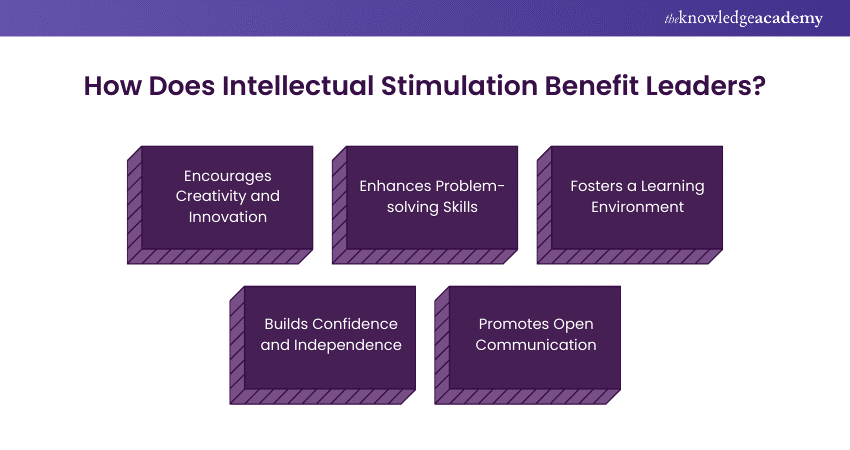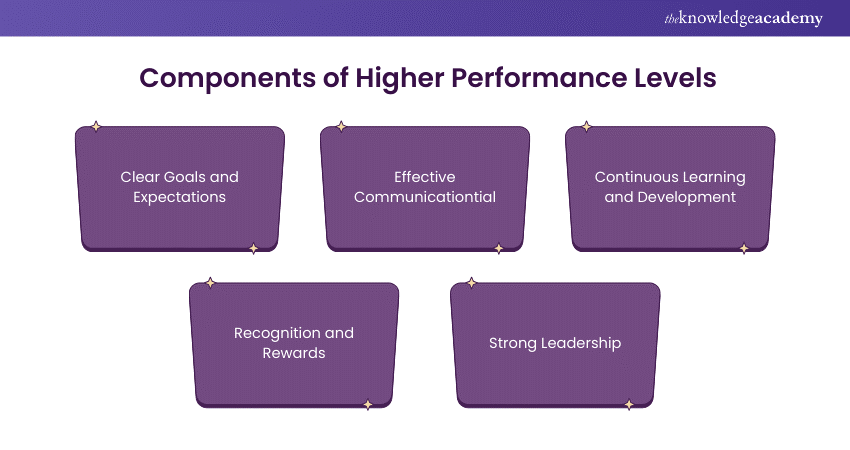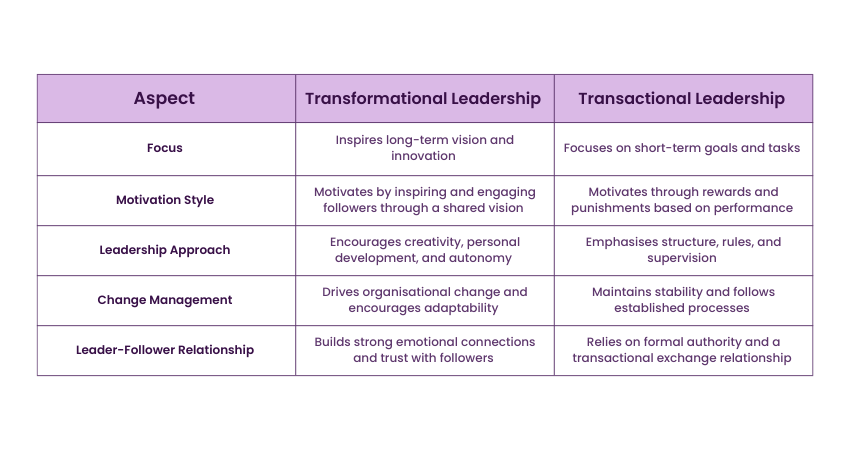We may not have the course you’re looking for. If you enquire or give us a call on +91-181-5047001 and speak to our training experts, we may still be able to help with your training requirements.
Training Outcomes Within Your Budget!
We ensure quality, budget-alignment, and timely delivery by our expert instructors.

Picture a Leader who transforms obstacles into opportunities and inspires their team to achieve extraordinary results. This is the core of Transformational Leadership Theory. By emphasising vision, communication, and empathy, this theory outlines the path to effective Leadership. Understanding its components and characteristics can revolutionise your approach. Dive into this blog to discover how this powerful Leadership style can transform not just your team but your entire organisation.
Table of Contents
1) What is Transformational Leadership Theory?
2) Core Components of Transformational Leadership
3) Characteristics of Transformational Leaders
4) Advantages of Transformational Leadership
5) Disadvantages of Transformational Leadership
6) Comparing Transformational and Transactional Leadership
7) Applications of Transformational Leadership in Various Industries
8) Conclusion
What is Transformational Leadership Theory?
Transformational Leadership Theory advocates a style of guidance that focuses on motivating employees, creating a vision, and encouraging them to achieve it. The essential skills of a Transformational Leader include the ability to mobilise employees, inspire them, and boost their morale.
Transformational Leaders lead by example. They typically integrate empathy, support, and inspiration into their Leadership approach and often demonstrate confidence and selflessness when leading. A Transformational Leader concentrates on reforming flawed systems and assembling employees who collaborate effectively to enhance productivity and overall job satisfaction.
Core Components of Transformational Leadership
Transformational Leadership Theory is built on several core components that distinguish it from other Leadership styles. Let’s delve into its core components:
1) Idealised Influence
Transformational Leaders who show off idealised influence function as role models for their followers by way of adhering to excessive requirements of ethical behaviour. Followers pick out with those Leaders and aspire to emulate them.
These Leaders generally uphold very high standards of ethical and moral behaviour and are acknowledged for doing the proper thing. They are deeply respected by their followers, who place an amazing deal of trust in them. They offer their followers an experience of vision and undertaking.
2) Inspirational Motivation
Inspirational motivation refers back to the extent to which a Leader expresses an appealing vision that inspires and motivates others to exceed expectations. Leaders who employ inspirational motivation set high standards and expectancies for their followers. They are optimistic about their followers’ capacity to reap goals and always offer that means via highlighting the importance of all duties.
These Leaders are adept at instilling a sturdy experience of purpose in their followers, thereby taking the group forward. This technique encourages followers to invest more attempt of their obligations, continue to be constructive approximately the destiny, and trust their own capabilities.
3) Intellectual Stimulation
Intellectual stimulation refers back to the volume to which Transformational Leaders challenge conventions, take risks, and solicit ideas from their followers. They understand followers via stimulation, creativity, and innovation.

The Leader supports and collaborates with followers as they try new approaches and develop innovative solutions to organisational issues. The Leader encourages followers to think independently and critically, fostering autonomy among them.
4) Individualised Consideration
Individualised consideration is the extent to which a Transformational Leader attends to each follower’s needs, acting as a mentor, coach, or guide. Such Leaders listens to the concerns and needs of each follower, providing support and showing empathy for each person’s situation and background.
When a Leader shows individualised consideration, they recognise the unique talents each follower brings to the workplace and support them in developing and showcasing these key skills and behaviours. This approach encourages followers to pursue further development and demonstrate intrinsic motivation in their work.
Transform your ability to inspire and lead teams – join our Leadership Courses today!
Characteristics of Transformational Leaders
Transformational Leaders own awesome characteristics that set them apart and enable them to drive major change inside their establishments. Let’s explore the important traits of Transformational Leaders:
1) Visionary Leadership
Transformational Leaders own a clear and compelling vision for the destiny. They can articulate this imaginative and prescient in a manner that evokes and motivates their followers to work closer to commonplace desires. Their visionary approach facilitates aligning the team’s efforts and fosters a feel of motive.
2) Strong Communication Skills
Effective communication is a hallmark of Transformational Leaders. They are adept at conveying their thoughts and expectations truly and persuasively. This ability enables them to build robust relationships with their followers, ensuring that everyone is on the same page and running collaboratively towards shared goals.
3) Emotional Intelligence
Transformational Leaders exhibit excessive levels of Emotional Intelligence. They are attuned to their very own feelings and of their followers, permitting them to manipulate relationships judiciously and empathetically. This emotional recognition helps create a supportive and better work environment.
4) Empowerment of Others
Empowering others is a key feature of Transformational Leaders. They believe in their followers and delegate duties, providing them with the autonomy to make selections. This empowerment fosters an experience of ownership and accountability among group participants, leading to increased motivation and productiveness.
Advantages of Transformational Leadership
Transformational Leadership has several benefits that can considerably enhance the overall performance of an organisation and employee satisfaction. Let’s explore its important advantages:
1) Employee Motivation and Engagement
Transformational Leadership appreciably boosts employee motivation and engagement. By growing a compelling vision and fostering supportive surroundings, Leaders encourage their followers to invest more effort and take satisfaction of their work. This heightened degree of engagement regularly leads to multiplied job satisfaction and loyalty.
2) Higher Performance Levels
Transformational Leaders set high requirements and expectancies, encouraging their followers to exceed their personal barriers. This technique not only enhances personal performance but also drives the overall productivity of the agency.

Employees are motivated to achieve their best, leading to superior performance outcomes.
3) Improved Organisational Culture
The emphasis on ethical behaviour, empathy, and help underneath Transformational Leadership contributes to a tremendous organisational subculture. Leaders who model these values create a surrounding of trust and respect, which in turn fosters collaboration and a sense of network amongst employees. This advanced lifestyle can result in better morale and decreased turnover prices.
4) Enhanced Innovation
Transformational Leaders inspire creativity and innovation through challenging the status quo and supporting new thoughts. They create a secure area for employees to experiment and take risks, which could lead to groundbreaking answers and upgrades. This recognition on innovation facilitates the enterprise to stay competitive and adapt to converting marketplace conditions.
Disadvantages of Transformational Leadership
Transformational Leadership has advantages, but it also has difficulties. Let’s explore its disadvantages below:
1) Potential for Burnout
Transformational Leaders need a lot of energy and dedication from both themselves and their team members. Sometimes, Leaders who push for constant growth and set high goals can make people feel too tired. Workers might feel stressed by always trying to do more, which can hurt their health and work.
2) Overemphasis on Charisma
Charisma can energise people, but excess can cause problems. Leaders who rely too heavily on their personalities might neglect crucial Leadership tasks such as planning and managing daily operations. Overdoing charisma can also lead to unrealistic expectations from followers.
Gain the skills to lead and motivate your tech team – register for our Technical Team Leading Training now!
3) Challenges in Implementation
Implementing changes in a company with established practices can be difficult. Resistance to change is common, and Leaders may struggle to gain consensus. Transforming an organisation requires significant time and effort, and maintaining momentum can be challenging.
4) Risks of Overdependence on the Leader
Transformational Leadership can sometimes lead to followers becoming overly dependent on the Leader. This reliance can hinder their ability to make independent decisions, potentially causing delays or misdirection.
Comparing Transformational and Transactional Leadership
Understanding the main differences between transformational and transactional Leadership provides valuable insights into effective Leadership and group motivation. Let’s examine the main differences:
1) Key Differences
Transformational Leadership aspires to inspire and motivate followers to exceed expectations by promoting a shared vision and encouraging innovation and change. In contrast, transactional Leadership relies on rewards and punishments to manage followers and maintain the status quo.

Transformational Leaders prioritise long-term goals and personal development, while transactional Leaders emphasise short-term tasks and performance metrics.
2) Situational Appropriateness
Transformational Leadership is mainly effective in dynamic and hastily converting environments wherein innovation and adaptability are important. It is well-suited for firms processing sizable change or in search of fostering a tradition of continuous development. Transactional management, on the other hand, is extra suitable in strong environments wherein clean systems and constant overall performance are essential. It is powerful in situations requiring strict adherence to procedures and on-spot outcomes.
3) Strengths and Weaknesses
Transformational management’s strengths encompass its capability to inspire and engage employees, foster creativity, and pressure long-term organisational trade. However, it can often lead to burnout and overdependence at the Leader. Transactional management’s strengths lie in its clarity, efficiency, and potential to hold order and consistency. Its weaknesses consist of an ability lack of innovation and a focus on quick-time period goals at the rate of long-time period growth.
Applications of Transformational Leadership in Various Industries
Transformational Leadership is versatile and can be effectively applied across a wide range of industries. Let’s explore how Transformational Leadership is utilised in various sectors:
1) Corporate Sector
In the corporate sector, Transformational Leadership can drive innovation, improve employee engagement, and enhance organisational performance. Leaders in this sector use their vision to align teams with the company’s strategic goals, fostering a culture of continuous improvement and adaptability.
2) Education
Transformational Leadership in education can inspire teachers and students to achieve higher levels of performance and personal growth. Educational Leaders who adopt this style create a supportive and motivating environment, encouraging innovative teaching methods and lifelong learning.
3) Non-profit Organisations
In non-profit organisations, Transformational Leadership can help align the team with the organisation’s mission and values. Leaders in this sector motivate volunteers and staff by emphasising the impact of their work, fostering a sense of purpose and commitment to the cause.
4) Government and Public Sector
Transformational Leadership in the government and public sector can drive policy innovation, improve public services, and enhance community engagement. Leaders in this sector use their vision to inspire and mobilise employees, encouraging them to work collaboratively towards common goals and public welfare.
Conclusion
Transformational Leadership Theory is more than a framework; it’s a dynamic force that empowers Leaders to ignite passion, foster innovation, and drive meaningful change. By harnessing its principles, Leaders can elevate their teams to new heights, creating a legacy of success and inspiration.
Sign up for our Business Development Training and unlock strategies to drive your business forward!
Frequently Asked Questions

To develop Transformational Leadership skills, focus on inspiring others through clear vision, fostering creativity, and encouraging personal development. Building strong communication, Emotional Intelligence, and problem-solving skills are also essential. Continuous self-reflection and feedback from peers can aid growth.

Yes, Transformational Leadership can be highly effective in times of crisis by providing vision, inspiring confidence, and driving innovative solutions amidst uncertainty.

The Knowledge Academy takes global learning to new heights, offering over 30,000 online courses across 490+ locations in 220 countries. This expansive reach ensures accessibility and convenience for learners worldwide.
Alongside our diverse Online Course Catalogue, encompassing 19 major categories, we go the extra mile by providing a plethora of free educational Online Resources like News updates, Blogs, videos, webinars, and interview questions. Tailoring learning experiences further, professionals can maximise value with customisable Course Bundles of TKA.

The Knowledge Academy’s Knowledge Pass, a prepaid voucher, adds another layer of flexibility, allowing course bookings over a 12-month period. Join us on a journey where education knows no bounds.

The Knowledge Academy offers various Leadership Courses, including the Leadership Skills Training, Agile Leadership Training, and Design Thinking Course. These courses cater to different skill levels, providing comprehensive insights into Agile Leadership.
Our Business Skills Blogs cover a range of topics related to Leadership Theory, offering valuable resources, best practices, and industry insights. Whether you are a beginner or looking to advance your Business skills, The Knowledge Academy's diverse courses and informative blogs have got you covered.
Upcoming Business Skills Resources Batches & Dates
Date
 Leadership Skills Training
Leadership Skills Training
Fri 27th Dec 2024
Fri 28th Feb 2025
Fri 11th Apr 2025
Fri 27th Jun 2025
Fri 22nd Aug 2025
Fri 24th Oct 2025
Fri 12th Dec 2025







 Top Rated Course
Top Rated Course



 If you wish to make any changes to your course, please
If you wish to make any changes to your course, please


